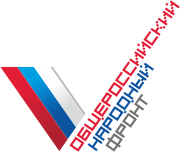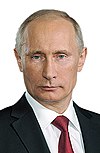All-Russia People's Front
This article may be expanded with text translated from the corresponding article in Russian. (October 2014) Click [show] for important translation instructions.
|
All-Russia People's Front Общероссийский народный фронт | |
|---|---|
 | |
| Leader | Vladimir Putin |
| Founder | Vladimir Putin |
| Founded | 6 May 2011 (2011-05-06) |
| Headquarters | Moscow, Russia |
| Ideology | Russian nationalism[1][2] National conservatism[3][4] Putinism Statism[5][6] Authoritarianism[7] |
| Colors | White, Blue, Red (Russian national colors) |
| Website | |
| onf.ru | |
| |
The All-Russia People's Front (Russian: Общероссийский народный фронт Obshcherossiyskiy narodnyy front), known by its Russian initialism ONF, is a political coalition in Russia started in 2011 by then-Prime Minister of Russia Vladimir Putin to provide United Russia with "new ideas, new suggestions and new faces". It is intended to be a formal alliance between the ruling party and numerous Russian nongovernmental organizations. On 12 June 2013, Putin was elected its leader.[8]
Contents
1 History
2 Member organizations
3 Analysis
4 References
5 External links
History

Poster of the front in a Marshrutka
At the meeting of United Russia on 6 May 2011, Putin called for the creation of a "broad popular front [of] like-minded political forces" to participate in the Duma election. He included United Russia and other political parties, business associations, trade unions and youth', women's and veterans' organizations. He claimed that United Russia's party list would include non-party candidates nominated by these organizations.[citation needed]
A website was set up involving headquarters, regional branches and leadership. The Front urged individuals and groups that care about the "fate" and "victory" of Russia and want "access to participation in power" to fill out an application on the website. Putin's aides have stated that he is the "informal head" of the popular front, but deputy prime minister and chief of government staff Vyacheslav Volodin was named the head of the popular front headquarters.[citation needed]
In April 2011 at a meeting with the Coordinating Council of the People's Front, Putin said the activities of the front would continue after the election season. At the same meeting, Putin also said that Russia should ensure that the parliament remained a leading political force.[9] By May 2011, hundreds of businesses had enlisted their workforces in the organization, including around 40,000 from the Siberian Business Union.[10]
On 12 June 2013, the movement convened its inaugural congress, electing Putin as its leader.[8] The congress also elected the front’s Central Staff: film director Stanislav Govorukhin, Delovaya Rossiya, co-chairman Alexander Galushka and State Duma member Olga Timofeyeva.[8]
According to the Charter, the Front’s goal is "promotion of unity and civil solidarity in the name of Russia’s historical success"; the country’s development as a free, strong and sovereign state with a robust economy; fast economic growth; and reliance on the family. On the list of the ONF founders were 480 people, including trade union activists, workers, scientists, culture workers, athletes, businessmen, farm and medical workers and politicians.[11]
On 4 December 2013, the conference of the Front was held. The conference, which ran until 6 December, discussed the process of implementing reforms in healthcare, economy, community services, education and culture. The meeting held numerous round tables on the president’s so-called "May decrees" and tackled internal agenda items.[12][13]
In January 2014, the Front registered its first regional office in the city of Lipetsk, located about 440 kilometers south of Moscow, with Russia’s Justice Ministry.[14]
Member organizations
Agrarian Party of Russia[citation needed]
Federation of Independent Trade Unions of Russia[citation needed]
Patriots of Russia[citation needed]
Progressive Socialist Party of Ukraine[15]
Russian Union of Industrialists and Entrepreneurs[citation needed]
United Russia[citation needed]
Young Guard of United Russia[citation needed]
Analysis
According to journalist Steve Rosenberg in an article for the BBC, the ONF may replace United Russia, which was the probable reason for its establishment.[16]
References
^ Nordsieck, Wolfram. "Parties and Elections in Europe". www.parties-and-elections.eu..mw-parser-output cite.citation{font-style:inherit}.mw-parser-output .citation q{quotes:"""""""'""'"}.mw-parser-output .citation .cs1-lock-free a{background:url("//upload.wikimedia.org/wikipedia/commons/thumb/6/65/Lock-green.svg/9px-Lock-green.svg.png")no-repeat;background-position:right .1em center}.mw-parser-output .citation .cs1-lock-limited a,.mw-parser-output .citation .cs1-lock-registration a{background:url("//upload.wikimedia.org/wikipedia/commons/thumb/d/d6/Lock-gray-alt-2.svg/9px-Lock-gray-alt-2.svg.png")no-repeat;background-position:right .1em center}.mw-parser-output .citation .cs1-lock-subscription a{background:url("//upload.wikimedia.org/wikipedia/commons/thumb/a/aa/Lock-red-alt-2.svg/9px-Lock-red-alt-2.svg.png")no-repeat;background-position:right .1em center}.mw-parser-output .cs1-subscription,.mw-parser-output .cs1-registration{color:#555}.mw-parser-output .cs1-subscription span,.mw-parser-output .cs1-registration span{border-bottom:1px dotted;cursor:help}.mw-parser-output .cs1-ws-icon a{background:url("//upload.wikimedia.org/wikipedia/commons/thumb/4/4c/Wikisource-logo.svg/12px-Wikisource-logo.svg.png")no-repeat;background-position:right .1em center}.mw-parser-output code.cs1-code{color:inherit;background:inherit;border:inherit;padding:inherit}.mw-parser-output .cs1-hidden-error{display:none;font-size:100%}.mw-parser-output .cs1-visible-error{font-size:100%}.mw-parser-output .cs1-maint{display:none;color:#33aa33;margin-left:0.3em}.mw-parser-output .cs1-subscription,.mw-parser-output .cs1-registration,.mw-parser-output .cs1-format{font-size:95%}.mw-parser-output .cs1-kern-left,.mw-parser-output .cs1-kern-wl-left{padding-left:0.2em}.mw-parser-output .cs1-kern-right,.mw-parser-output .cs1-kern-wl-right{padding-right:0.2em}
^ Chen, Cheng (6 July 2016). The Return of Ideology: The Search for Regime Identities in Postcommunist Russia and China. University of Michigan Press. p. 87. ISBN 9780472119936. Retrieved 26 May 2017.
^ "Russia parliament elections: How the parties line up". BBC News Online. BBC. 6 March 2012. Retrieved 11 May 2017.
^ Sakwa, Richard (2013). Power and Policy in Putin’s Russia. Routledge. p. 7. ISBN 9781317989943. Retrieved 26 May 2017.
^ Sakwa, Richard (2013). Power and Policy in Putin's Russia. Routledge. p. 7. ISBN 978-1-317-98994-3. Retrieved 14 October 2017.
^ de Vogel, Sasha (25 October 2012). "New Russian "Patriots"". The Institute of Modern Russia. Retrieved 26 May 2017.
^ "Putin's new authoritarian Russia". theglobalstate.com.
^ abc Putin becomes Popular Front for Russia leader, Interfax-Ukraine (13 June 2013)
^ "People's Front to Remain Active After Elections - Putin, RIA Novosti, April 3, 2012". En.rian.ru. 2011-05-06. Retrieved 2013-01-08.
^ "Echo of Soviet era in Putin's bid for votes". The Australian. 2011-06-17.
^ "Putin-led People's Front for Russia - supra-party resource uniting society". Itar Tass. Retrieved 15 June 2013.
^ "Putin to attend All-Russia People's Front conference". Voice of Russia. Retrieved 5 December 2013.
^ "Putin Complains of Rusty Water at Home". RIA Novosti. Retrieved 5 December 2013.
^ "Putin-Led Civic Movement Registers First RegionalBranch". RIA Novosti. Retrieved 3 January 2014.
^ "Прогрессивная социалистическая партия Украины присоединилась к".
^ "Putin inaugurates new movement amid fresh protests". BBC. Retrieved 2013-06-12.
External links
Declaration of the Formation of the All-Russia People's Front (in English)
